Résultats de recherche de titre
Articles 1494421 à 1494440 sur 1497603
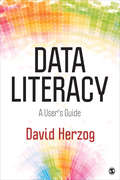
Data Literacy: A User′s Guide
Par David L. Herzog. 2016
A practical, skill-based introduction to data analysis and literacy We are swimming in a world of data, and this handy…
guide will keep you afloat while you learn to make sense of it all. In Data Literacy: A User′s Guide, David Herzog, a journalist with a decade of experience using data analysis to transform information into captivating storytelling, introduces students and professionals to the fundamentals of data literacy, a key skill in today’s world. Assuming the reader has no advanced knowledge of data analysis or statistics, this book shows how to create insight from publicly-available data through exercises using simple Excel functions. Extensively illustrated, step-by-step instructions within a concise, yet comprehensive, reference will help readers identify, obtain, evaluate, clean, analyze and visualize data. A concluding chapter introduces more sophisticated data analysis methods and tools including database managers such as Microsoft Access and MySQL and standalone statistical programs such as SPSS, SAS and R.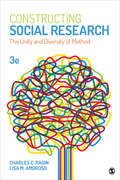
Constructing Social Research: The Unity and Diversity of Method (Sociology For A New Century Ser.)
Par Charles C. Ragin, Lisa M. Amoroso. 2019
The updated Third Edition of this innovative text shows the unity within the diversity of activities called social research to…
help students understand how all social researchers construct representations of social life using theories, systematic data collection, and careful examination of that data. The book tackles questions like "What is social research?", "How does it differ from journalism, documentary film-making, or laboratory research in the natural sciences?", and "What is the researcher′s obligation to those he or she is studying?" Updated throughout with new references and examples, this edition is designed to evoke challenging questions regarding the nature of representation and the ethical challenges facing social scientific researchers. The text moves beyond standard research challenges to push readers to see the complex relationships among ethics, ideas, evidence, and outcomes.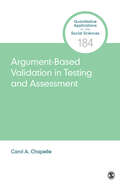
Argument-Based Validation in Testing and Assessment (Quantitative Applications in the Social Sciences #184)
Par Carol A. Chapelle. 2021
Carol A. Chapelle shows readers how to design validation research for tests of human capacities and performance. Any test that…
is used to make decisions about people or programs should have undergone extensive research to demonstrate that the scores are actually appropriate for their intended purpose. Argument-Based Validation in Testing and Assessment is intended to help close the gap between theory and practice, by introducing, explaining, and demonstrating how test developers can formulate the overall design for their validation research from an argument-based perspective.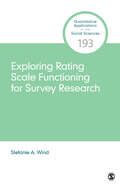
Exploring Rating Scale Functioning for Survey Research (Quantitative Applications in the Social Sciences)
Par Stefanie A. Wind. 2023
Items with ordered response categories are common in survey research, such as when respondents are asked how much they agree…
with certain statements. But how large are the differences between categories of response, and how well do they distinguish between respondents? This volume is the first to introduce the evaluation of rating scales to an audience of survey researchers. Evaluating Rating Scale Functioning for Survey Research provides researchers with an overview of rating scale analysis along with practical guidance on how to conduct such analyses with their own survey data. Author Stefanie A. Wind presents three categories of methods: Rasch models; non-Rasch Item Response Theory (IRT) models; and non-parametric models, together with practical examples. Tutorials, datasets, and software code (R and Facets) to accompany the book are available on the book’s website.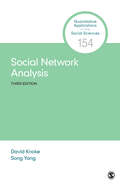
Social Network Analysis: Methods And Examples (Quantitative Applications in the Social Sciences #154)
Par David Knoke, Song Yang. 2020
David Knoke and Song Yang′s Social Network Analysis, Third Edition provides a concise introduction to the concepts and tools of…
social network analysis. The authors convey key material while at the same time minimizing technical complexities. The examples are simple: sets of 5 or 6 entities such as individuals, positions in a hierarchy, political offices, and nation-states, and the relations between them include friendship, communication, supervision, donations, and trade. The new edition reflects developments and changes in practice over the past decade. The authors also describe important recent developments in network analysis, especially in the fifth chapter. Exponential random graph models (ERGMs) are a prime example: when the second edition was published, P* models were the recommended approach for this, but they have been replaced by ERGMs. Finally, throughout the volume, the authors comment on the challenges and opportunities offered by internet and social media data.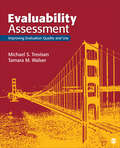
Evaluability Assessment: Improving Evaluation Quality and Use
Par Michael S. Trevisan, Tamara M. Walser. 2015
Evaluability assessment (EA) can lead to development of sound program theory, increased stakeholder involvement and empowerment, better understanding of program…
culture and context, enhanced collaboration and communication, process and findings use, and organizational learning and evaluation capacity building. This book provides an up-to-date treatment of EA, clarifies what it actually is and how it can be used, demonstrates EA as an approach to evaluative inquiry with multidisciplinary and global appeal, and identifies and describes the purposes and benefits to using EA. Using case examples contributed by EA practitioners, the text illustrates important features of EA use, and showcases how EA is used in a variety of disciplines and evaluation contexts. This text is appropriate as an instructional text for graduate level evaluation courses and training, and as a resource for evaluation practitioners, policymakers, funding agencies, and professional training.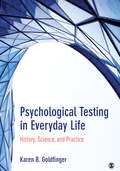
Psychological Testing in Everyday Life: History, Science, and Practice
Par Karen B. Goldfinger. 2019
Psychological Testing in Everyday Life explores how psychological testing is used in real-life settings to make the study of psychometrics…
interesting, relevant, and highly accessible. Author Karen B. Goldfinger examines a broad range of carefully selected topics to capture student interest, encourage critical thinking, and spark class discussions. Organized in the form of an applied casebook, each chapter presents the complex issues that arise when using psychological tests in a variety of settings, providing an in-depth view of psychological testing practices, historically and in the present. This unique text will support students in becoming thoughtful, informed consumers and providers of psychological assessment.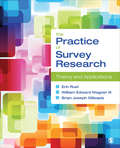
The Practice of Survey Research: Theory and Applications
Par Brian Joseph Gillespie, William E. Wagner-Huang, Erin Ruel. 2016
Unique in its integration of theory and application, this comprehensive book explains survey design, implementation, data analysis, and continuing data…
management, including how to effectively incorporate the latest technology (e.g., SurveyMonkey and Qualtrics). Data management and analysis are demonstrated and explained through statistical software including SPSS, SAS, and STATA. In addition to helping students develop a complete understanding of survey research from start to finish, the authors also address the challenges and issues of specific disciplines.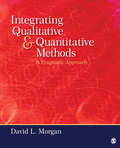
Integrating Qualitative and Quantitative Methods: A Pragmatic Approach
Par David L. Morgan. 2014
Focusing on research designs for projects that collect both qualitative and quantitative data, this practical book discusses strategies for bringing…
qualitative and quantitative methods together so that their combined strengths accomplish more than is possible with a single method. The approach is broadly interdisciplinary, reflecting the interest in mixed methods research of social scientists from anthropology, communication, criminal justice, education, evaluation, nursing, organizational behavior, psychology, political science, public administration, public health, sociology, social work, and urban studies. In contrast to an "anything goes" approach or a naïve hope that "two methods are better than one," the author argues that projects using mixed methods must pay even more attention to research design than single method approaches. The book’s practical emphasis on mixed methods makes it useful both to active researchers and to students who intend to pursue such a career.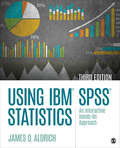
Using IBM SPSS Statistics: An Interactive Hands-On Approach
Par James O. Aldrich. 2019
Now with a new companion website! Using IBM® SPSS® Statistics: An Interactive Hands-On Approach, Third Edition gives readers an accessible…
and comprehensive guide to walking through SPSS®, providing them with step-by-step knowledge for effectively analyzing their data. From entering data to working with existing databases, and working with the help menu through performing factor analysis, Using IBM® SPSS® Statistics covers every aspect of SPSS® from introductory through intermediate statistics. The book is divided into parts that focus on mastering SPSS® basics, dealing with univariate statistics and graphing, inferential statistics, relational statistics, and more. Written using IBM® SPSS® version 25 and 24, and compatible with the earlier releases, this book is one of the most comprehensive SPSS® guides available. Bundle Using IBM® SPSS® Statistics: An Interactive Hands-On Approach with SAGE IBM® SPSS® Statistics v24.0 Student Version and SAVE! – Bundle ISBN: 978-1-5443-5071-4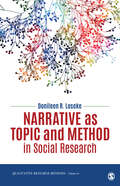
Narrative as Topic and Method in Social Research (Qualitative Research Methods)
Par Donileen R. Loseke. 2022
Narrative research is an increasingly popular qualitative method across the social sciences. This book has two purposes: firstly to show…
students and researchers how to do research on narrative topics, particularly on questions about narrative productions of meaning, and secondly to explain some fundamentals of research methods suitable for exploring these topics. A final part of the book provides empirical examples of how such research is done. These chapters use small amounts of data to examine the analytic tasks of designing research questions, finding appropriate data, sampling decisions, contextualization, data categorization, and communicating study findings.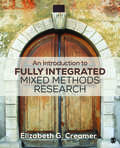
An Introduction to Fully Integrated Mixed Methods Research
Par Elizabeth G. Creamer. 2018
This practical book provides the tools needed to design, execute, and evaluate fully integrated mixed methods research studies. A uniting…
metaphor of the architectural arch helps students understand the benefits of a mixed methods approach as they consider ways to integrate the qualitative and quantitative strands at all stages of design and execution. With use of examples from popular media and published research, this text also includes a detailed discussion of ways to accomplish mixing methods during data collection and analysis and a separate chapter on designing and executing a realistic mixed methods dissertation.
Evaluability Assessment: Improving Evaluation Quality and Use
Par Michael S. Trevisan, Tamara M. Walser. 2015
Evaluability assessment (EA) can lead to development of sound program theory, increased stakeholder involvement and empowerment, better understanding of program…
culture and context, enhanced collaboration and communication, process and findings use, and organizational learning and evaluation capacity building. This book provides an up-to-date treatment of EA, clarifies what it actually is and how it can be used, demonstrates EA as an approach to evaluative inquiry with multidisciplinary and global appeal, and identifies and describes the purposes and benefits to using EA. Using case examples contributed by EA practitioners, the text illustrates important features of EA use, and showcases how EA is used in a variety of disciplines and evaluation contexts. This text is appropriate as an instructional text for graduate level evaluation courses and training, and as a resource for evaluation practitioners, policymakers, funding agencies, and professional training.
Narrative as Topic and Method in Social Research (Qualitative Research Methods)
Par Donileen R. Loseke. 2022
Narrative research is an increasingly popular qualitative method across the social sciences. This book has two purposes: firstly to show…
students and researchers how to do research on narrative topics, particularly on questions about narrative productions of meaning, and secondly to explain some fundamentals of research methods suitable for exploring these topics. A final part of the book provides empirical examples of how such research is done. These chapters use small amounts of data to examine the analytic tasks of designing research questions, finding appropriate data, sampling decisions, contextualization, data categorization, and communicating study findings.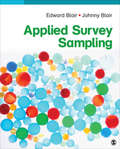
Applied Survey Sampling
Par Johnny Blair, Edward Blair. 2015
Written for students and researchers who wish to understand the conceptual and practical aspects of sampling, this book is designed…
to be accessible without requiring advanced statistical training. It covers a wide range of topics, from the basics of sampling to special topics such as sampling rare populations, sampling organizational populations, and sampling visitors to a place. Using cases and examples to illustrate sampling principles and procedures, the book thoroughly covers the fundamentals of modern survey sampling, and addresses recent changes in the survey environment such as declining response rates, the rise of Internet surveys, the need to accommodate cell phones in telephone surveys, and emerging uses of social media and big data.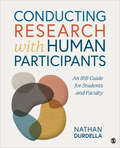
Conducting Research with Human Participants: An IRB Guide for Students and Faculty
Par Nathan Richard Durdella. 2023
Conducting Research with Human Participants: An IRB Guide for Students and Faculty by Nathan Durdella is the only guidebook students and…
faculty will need to navigate the IRB process and secure swift approval of research protocols. This book serves as an advisor to walk researchers through all the details of drafting, submission, and revision of materials for Institutional Review Boards so they can complete their research projects or dissertations faster. This text walks readers through the history of Institutional Review Boards, the contemporary context of ethical research, strategies to effectively draft, submit, and revise an IRB protocol, and guidance on working with an approved protocol in the field. The latest updates to the Common Rule and other regulatory frameworks, including special protections for working with vulnerable groups, are covered throughout the text. Not every research project goes according to plan, so adverse events and reporting receive special coverage. A final chapter on ethical research practices beyond IRB compliance encourages researchers to think through how to exit the field of research and ensure their research benefits the individuals, families, and communities in which they work. Take the guesswork out of the IRB process from start to finish with this handy guide.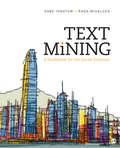
Text Mining: A Guidebook for the Social Sciences
Par Gabe Ignatow, Rada F. Mihalcea. 2017
Online communities generate massive volumes of natural language data and the social sciences continue to learn how to best make…
use of this new information and the technology available for analyzing it. Text Mining brings together a broad range of contemporary qualitative and quantitative methods to provide strategic and practical guidance on analyzing large text collections. This accessible book, written by a sociologist and a computer scientist, surveys the fast-changing landscape of data sources, programming languages, software packages, and methods of analysis available today. Suitable for novice and experienced researchers alike, the book will help readers use text mining techniques more efficiently and productively.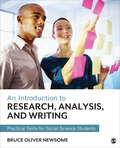
An Introduction to Research, Analysis, and Writing: Practical Skills for Social Science Students
Par Bruce Oliver Newsome. 2016
This accessible guide walks readers through the process of completing a social science research project. Written specifically to meet the…
needs of undergraduate research classes, it introduces students to a complete skill set, including: planning, design, analysis, argumentation, criticizing theories, building theories, modeling theories, choosing methods, gathering data, presenting evidence, and writing the final product. Students can use this text as a practical resource to navigate through each stage of the process, including choices between more advanced research techniques.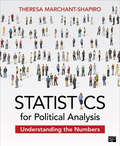
Statistics for Political Analysis: Understanding the Numbers
Par Theresa Marchant-Shapiro. 2015
Statistics are just as vital to understanding political science as the study of institutions, but getting students to understand them…
when teaching a methods course can be a big challenge. Statistics for Political Analysis makes understanding the numbers easy. The only introduction to statistics book written specifically for political science undergraduates, this book explains each statistical concept in plain language—from basic univariate statistics and the basic measures of association to bivariate and multivariate regression—and uses real world political examples. Students learn the relevance of statistics to political science, how to understand and calculate statistics mathematically, and how to obtain them using SPSS. All calculations are modeled step-by-step, giving students needed practice to master the process without making it intimidating. Each chapter concludes with exercises that get students actively applying the steps and building their professional skills through data calculation, analysis, and memo writing.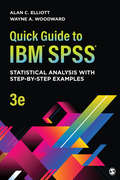
Quick Guide to IBM® SPSS®: Statistical Analysis With Step-by-Step Examples
Par Alan C. Elliott, Wayne A. Woodward. 2020
A perfect supplement for an introductory statics course. Quick Guide to IBM® SPSS®: Statistical Analysis With Step-by-Step Examples gives students…
the extra guidance with SPSS they need without taking up valuable in-class time. A practical, accessible guide for using software while doing data analysis in the social sciences, students can learn SPSS on their own, allowing instructors to focus on the concepts and calculations in their lectures, rather than SPSS tutorials. Designed to work across disciplines, the authors have provided a number of SPSS "step-by-step" examples in chapters showing the user how to plan a study, prepare data for analysis, perform the analysis and interpret the output from SPSS. The new Third Edition covers IBM® SPSS® version 25, includes a new section on Syntax, and all chapters have been updated to reflect current menu options along with many SPSS screenshots, making the process much simpler for the user. In addition, helpful hints and insights are provided through the features "Tips and Caveats" and "Sidebars."